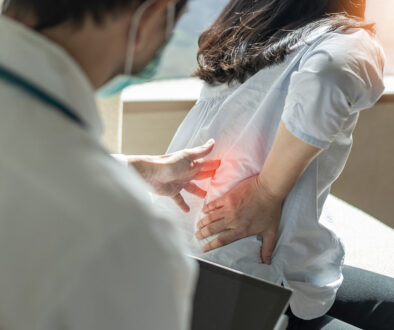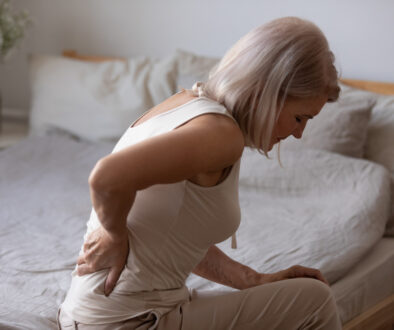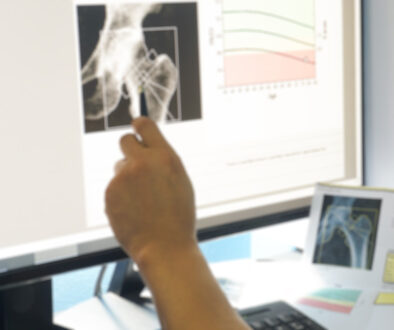When Should You Start Osteoporosis Screening?
More than 10 million Americans age 50 and over have osteoporosis, a disease that causes brittle bones, placing them at greater risk for having serious fractures. Regular osteoporosis screening can help prevent or treat some of the devastating aspects of osteoporosis.
At what ages should routine screening for osteoporosis begin? There are several items that determine the answer, including your risk factors and family history. However, if you have no major risk factors, We suggest that women start screening for osteoporosis at age 65 and Men at age 70.
It’s important to know how to prevent osteoporosis and understand its genetic connections. We’ll take a look at these and some other important facts—including how to prevent osteoporosis.
What Is Osteoporosis?
Your bones are constantly transforming—new bone is being made to replace the loss of older bone. However, when not enough new bone is being made, you’re at risk for developing osteoporosis.
This is a disease that causes your bones to become so brittle that they are extremely susceptible to breaking. In some cases, even something as simple as coughing can cause a fracture.
At What Age Should Routine Osteoporosis Screening Begin?
As we mentioned earlier, this depends upon your risk for developing the disease. (We’ll review some of these risk factors later in this article.)
Women should be screened for osteoporosis regularly starting at age 65, but if they have a family history of the disease or previous fractures, they should be screened as soon as they reach menopause.
Men may be screened starting at age 70, but if they are at risk of developing the disease, they should begin screening around age 50.
Who Should Be Screened for Osteoporosis?
We believe a bone density scan to check for osteoporosis should be a part of your regular wellness visit, especially if you fall into one of the following categories which place you at higher risk for developing the disease.
You are at higher risk of developing osteoporosis if you:
- Are white or Asian-American
- Are female, particularly if you are in menopause
- Have a family history of osteoporosis or fractures
- Have a smaller body frame
- Have hormonal issues, such as lowered sex hormones, thyroid problems or overactive adrenal glands
- Have an eating disorder
- Do not get enough calcium in your diet
Is Osteoporosis Genetic?
Research has shown that there is a strong genetic component with osteoporosis. You are at much greater risk of developing the disease if your mother or father fractured a hip.
In addition, Asian-American and white women are at higher risk of developing osteoporosis than others.
How To Prevent Osteoporosis
While there are risk factors you can’t change, such as your age, there are ways that you can help prevent the bone loss that leads to osteoporosis. These ways include:
Get plenty of calcium
We recommend 1,000 mg for women 50 and younger and 1,200 mg for women 51 and older. If you’re not sure if you’re getting enough calcium from your diet, speak to us about adding a calcium supplement.
Eat a well-balanced diet
Our dietitian, Nicole Matala can create a wonderful and delicious nutritional plan for you.
Get regular exercise
The best way to promote bone health is through weight-bearing exercises coupled by resistance exercises. For them to be most effective, you should participate three or four days each week. This will also strengthen your muscles which, in turn, will improve your balance and reduce your risk of falling.
Take medication
In certain cases, you may benefit from prescription medications that help prevent bone loss. We’ll evaluate your individual case and see if prescription medication is the right treatment for you.
Continue to adopt a healthy lifestyle
Adopting—and maintaining—healthy habits can help maintain your bone health. This includes:
- Limiting your alcohol intake.
- Maintaining a healthy weight
- If you smoke, quit smoking.
- Following a healthy eating plan.
Raleigh Adult Medicine Offers Regular Screenings for Osteoporosis
To help determine if you are developing osteoporosis, we conduct a bone density scan. This painless, non-invasive exam takes less than 15 minutes. It carefully examines the amount of minerals in an area of bone to determine if you have low bone mass, which can be an indicator of the earliest stages of osteoporosis.
The most commonly tested areas are the spine, hip and forearm.
For more than two decades, we have helped area residents maintain healthy bones by pinpointing problems before they develop into advanced osteoporosis. For those who have osteoporosis, we create a comprehensive treatment plan that helps restore their bone health, dramatically reducing their risk for fractures.
If you’d like to know more, or schedule a bone density test, scheduling an appointment is quick and easy.




